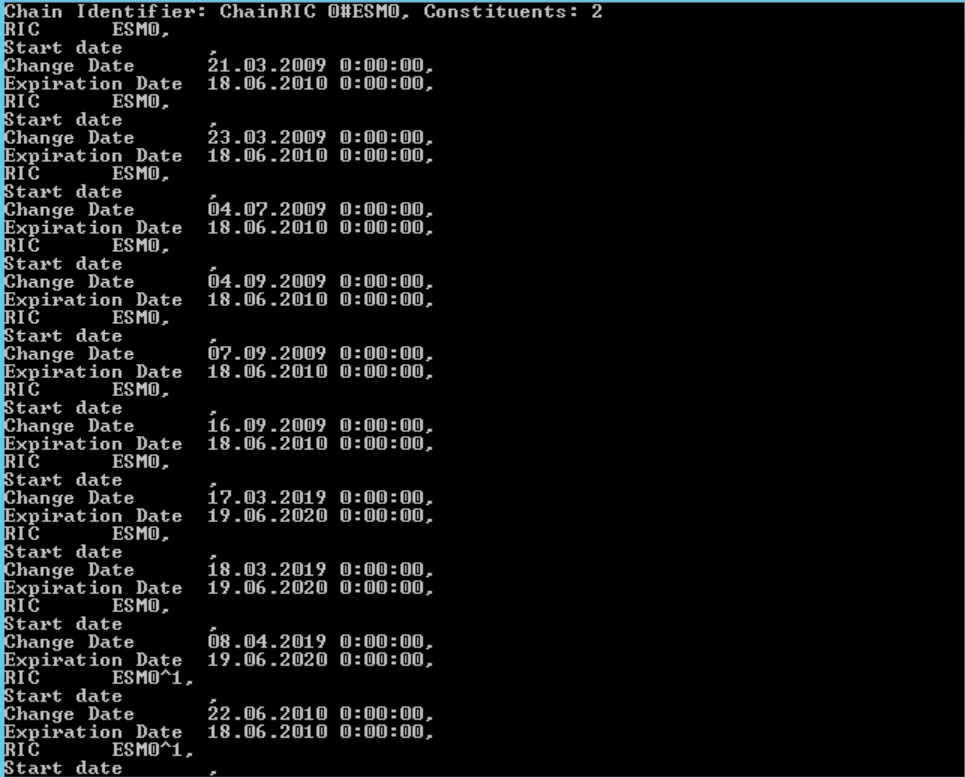RIC: ESM0 (RawLegacyMarketDepth)
Problem:
I find RIC: ESM0, as shown in the pictures, under RIC: ESM0 there are many files with different "Change Date" and "Expiration Date" (06/18/2020 and 06/19/2020)

Which of these RICs is correct?
Problem, downloading everything, all RIC: ESM0 with different "Change Date" and "Expiration Date"
files of 90 gigabytes
Help with the answer, what to change in the code so that only one RIC is downloaded with the correct expiration date and where is the earliest update date of the message in history or earliest RIC date.
Please give an example of the code in the answer in C #example code.
code:
using System;
using System.Linq;
using System.Diagnostics;
using System.IO;
using ThomsonReuters.Dss.Api.StandardExtractions;
using ThomsonReuters.Dss.Api;
using ThomsonReuters.Dss.Api.Content;
using ThomsonReuters.Dss.Api.Extractions;
using ThomsonReuters.Dss.Api.Extractions.ExtractionRequests;
using ThomsonReuters.Dss.Api.Extractions.ReportExtractions;
using ThomsonReuters.Dss.Api.Extractions.ReportTemplates;
using ThomsonReuters.Dss.Api.Extractions.Schedules;
using ThomsonReuters.Dss.Api.Extractions.SubjectLists;
using ThomsonReuters.Dss.Api.Search;
using ThomsonReuters.Dss.Core.RestApi;
using System.Text;
using ICSharpCode.SharpZipLib.GZip;
namespace RefinitivHistoryTesting
{
class Program
{
static void Main(string[] args)
{
//-----------------------------------------------------------------
//Connect and authenticate to the DSS server:
//-----------------------------------------------------------------
Uri dssUri = new Uri("https://hosted.datascopeapi.reuters.com/RestApi/v1/");
string dssUserName = "*****";
string dssUserPassword = "*****";
var out_dir = @".\Storage\";
var SearchContext = new SearchContext(dssUri, dssUserName, dssUserPassword);
var ExtractionsContext = new ExtractionsContext(dssUri, dssUserName, dssUserPassword);
ExtractionsContext.Options.AutomaticDecompression = false;
try
{
ExtractionsContext.DefaultRequestHeaders.Add("x-direct-download", "true");
}
catch (Exception)
{ }
var availableMbPFields = ExtractionsContext.GetValidContentFieldTypes(ReportTemplateTypes.TickHistoryRaw);
var availableTnSFields = ExtractionsContext.GetValidContentFieldTypes(ReportTemplateTypes.TickHistoryTimeAndSales);
var dateRange = DateTimeRange.Create(
new DateTimeOffset(2008, 01, 01, 0, 0, 0, TimeSpan.Zero),
new DateTimeOffset(2020, 12, 22, 0, 0, 0, TimeSpan.Zero));
var request = new HistoricalChainResolutionRequest
{
ChainRics = new[] { "0#ESM0" },//{ "0#ESH1"},//{ "0#ECSSH1" },//{ "0#1URO:" },
Range = dateRange
};
var chain_results = SearchContext.HistoricalChainResolution(request);
foreach (var chain in chain_results)
{
Console.WriteLine("Chain Identifier: {0} {1}, Constituents: {2}", chain.IdentifierType, chain.Identifier, chain.Constituents.Count());
foreach (var constituent in chain.Constituents)
{
var searchResults = SearchContext.HistoricalSearch(
HistoricalSearchRequest.Create(
constituent.Identifier, constituent.IdentifierType, dateRange, HistoricalResultsBy.Ric, null));
//foreach (var result in from pos in searchResults where pos.DomainCode == "8" select pos)
//foreach (var result in searchResults)
var result = searchResults.FirstOrDefault(pos => pos.Identifier.Contains("ESM0"));//("ESH1m"));//("ECSSH1"));
if (result != null)
{
var extractionDatesResult = ExtractionsContext.Extract(
new HistoricalReferenceExtractionRequest
{
ContentFieldNames = new DssCollection<string>()
{
"RIC", "Start date", "Change Date", "Expiration Date"
},
Condition = new HistoricalReferenceCondition
{
StartDate = result.FirstDate,
EndDate = result.LastDate
},
IdentifierList = new InstrumentIdentifierList
{
InstrumentIdentifiers = new[]
{
InstrumentIdentifier.Create(result.IdentifierType, result.Identifier)
},
ValidationOptions = new InstrumentValidationOptions
{
AllowHistoricalInstruments = true
},
UseUserPreferencesForValidationOptions = false
}
});
dynamic srcLastDate = null;
foreach (var content in extractionDatesResult)
foreach (var prop in content.DynamicProperties)
{
Console.WriteLine("{0}\t {1},\r", prop.Key, prop.Value);
if (srcLastDate == null && prop.Key == "Expiration Date" && prop.Value != null) srcLastDate = prop.Value;
}
dynamic lastDate = srcLastDate != null ? new DateTimeOffset(srcLastDate) : new DateTimeOffset(DateTime.UtcNow); //result.LastDate;
dynamic startDate = result.FirstDate;//lastDate.AddMonths(-1);//new DateTimeOffset(2020, 12, 22, 0, 0, 0, TimeSpan.Zero); //lastDate.AddMonths(-4);//result.FirstDate;
Console.WriteLine("{0},\t {1},\t {2},\t {3},\t {4}", result.Identifier, result.IdentifierType, startDate, lastDate, result.DomainCode);
var extractionResult = ExtractionsContext.ExtractRaw(
new TickHistoryMarketDepthExtractionRequest
{
Condition = new TickHistoryMarketDepthCondition
{
ReportDateRangeType = ReportDateRangeType.Range,
QueryStartDate = startDate, //new DateTimeOffset(2016, 07, 25, 20, 0, 0, TimeSpan.Zero),
QueryEndDate = lastDate, //new DateTimeOffset(2016, 08, 02, 19, 59, 59, TimeSpan.Zero),
ExtractBy = TickHistoryExtractByMode.Ric,
MessageTimeStampIn = TickHistoryTimeOptions.GmtUtc,
SortBy = TickHistorySort.SingleByRic,
View = TickHistoryMarketDepthViewOptions.LegacyLevel2,
DisplaySourceRIC = true
},
IdentifierList = new InstrumentIdentifierList
{
InstrumentIdentifiers = new[]
{
InstrumentIdentifier.Create(result.IdentifierType, result.Identifier)
},
ValidationOptions = new InstrumentValidationOptions
{
AllowHistoricalInstruments = true
}
},
});
string line;
var fileName = out_dir + "_" + result.Identifier + "_" + startDate.DateTime.ToString("dd.MM.yyyy") + "_" + lastDate.DateTime.ToString("dd.MM.yyyy") + "_RawLegacyMarketDepth.csv";
var sw = new StreamWriter(fileName, false);
var streamResponse = ExtractionsContext.GetReadStream(extractionResult);
using (GZipInputStream gzip = new GZipInputStream(streamResponse.Stream))
{
using (StreamReader reader = new StreamReader(gzip, Encoding.UTF8))
{
while ((line = reader.ReadLine()) != null)
{
sw.WriteLine(line);
}
}
}
sw.Close();
}
}
}
try
{
ExtractionsContext.DefaultRequestHeaders.Remove("x-direct-download");
}
catch (Exception)
{ }
Console.WriteLine("Press Enter to exit");
Console.ReadLine();
}
}
}



